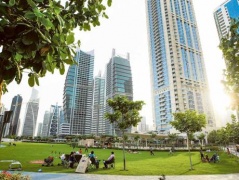24.03.2016

Share prices of Emaar and Arabtec propelled to 43 and 86%, while the number of real estate transactions is growing in almost all areas of Dubai. Global Capital Partners and Allsopp & Allsopp consultancies both have recorded that investors in the Dubai’s housing market are becoming noticeably more active, while stocks of Dubai's real estate developers break records at the region’s financial markets.
As imexre.com wrote last week, the optimism of Dubai's real estate traders starts affecting the majority of potential investors, which is now confirmed by official statistics. The surest factor, meaning the financial index, indicates that the emirate’s and the UAE’s largest construction companies are doing pretty good: shares prices of such giants like Emaar and Arabtec increased in recent months to 43 and 86%, respectively, while stocks of another major developer Union Properties increased to 46%.
The number of transactions is also growing fast. Starting with such areas like Jumeirah Village, Sports City and JLT, property buying itch is now spreading to elite locations, Global Capital Partners revealed in its report.
“There appears to be much greater optimism on the visibility of earnings as investors have realised that the pessimism had been overdone,” said Sameer Lakhani, Managing Director at Global Capital Partners.
For its part, Allsopp & Allsopp recorded a surge in buying activity on the basis of their sales transactions: in February it registered 62% more transactions than the previous month, while 52% of properties listed for sale were on the market for less than two weeks before they were sold.
Lookup portal believes that Dubai property prices returned to its pre-winning Expo 2020 levels, meaning that the subsequent correction after that just cooled down the unnecessary speculative hype.
In February, according to imexre.com and the GCP, the number of transactions has grown even in such prestigious Dubai areas as Palm Jumeirah (42 transactions in February), JLT (97 deals), Emirates Living (92 deals), Downtown (44 deals versus 38 in January) and Jumeirah Village (72 transactions in February versus 52 in January). It is expected that other elite residential communities will soon follow them.
“What we are witnessing is a continuing stabilisation of transactional activity across the spectrum of communities,” said Sameer Lakhani.
As imexre.com wrote last week, the optimism of Dubai's real estate traders starts affecting the majority of potential investors, which is now confirmed by official statistics. The surest factor, meaning the financial index, indicates that the emirate’s and the UAE’s largest construction companies are doing pretty good: shares prices of such giants like Emaar and Arabtec increased in recent months to 43 and 86%, respectively, while stocks of another major developer Union Properties increased to 46%.
The number of transactions is also growing fast. Starting with such areas like Jumeirah Village, Sports City and JLT, property buying itch is now spreading to elite locations, Global Capital Partners revealed in its report.
“There appears to be much greater optimism on the visibility of earnings as investors have realised that the pessimism had been overdone,” said Sameer Lakhani, Managing Director at Global Capital Partners.
For its part, Allsopp & Allsopp recorded a surge in buying activity on the basis of their sales transactions: in February it registered 62% more transactions than the previous month, while 52% of properties listed for sale were on the market for less than two weeks before they were sold.
Lookup portal believes that Dubai property prices returned to its pre-winning Expo 2020 levels, meaning that the subsequent correction after that just cooled down the unnecessary speculative hype.
In February, according to imexre.com and the GCP, the number of transactions has grown even in such prestigious Dubai areas as Palm Jumeirah (42 transactions in February), JLT (97 deals), Emirates Living (92 deals), Downtown (44 deals versus 38 in January) and Jumeirah Village (72 transactions in February versus 52 in January). It is expected that other elite residential communities will soon follow them.
“What we are witnessing is a continuing stabilisation of transactional activity across the spectrum of communities,” said Sameer Lakhani.






